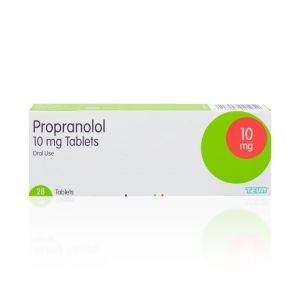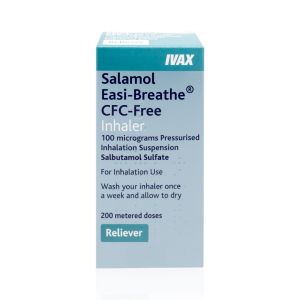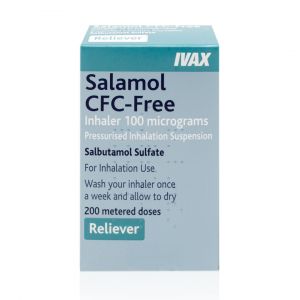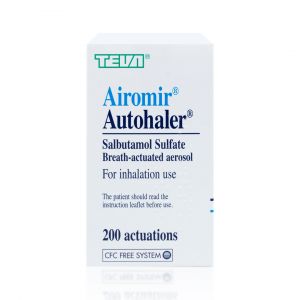Asthma is a long-term condition that affects the airways, causing sufferers’ wind pipes to tighten, swell or over produce mucus. This makes it difficult to breathe and causes symptoms like tightness of the chest, coughing or wheezing. Most commonly, asthma develops in children, and sometimes sufferers can grow out of the condition as they get older. It’s thought that you are more likely to develop asthma if a close relative also has the condition.
A severe asthma attack can be fatal, but there are extremely effective treatments available which can relieve asthma symptoms and prevent life-threatening situations. People with well-managed asthma can still participate in sport and live normal lives.
Below are some common medicines often used to treat asthma. Please note, this is not an exhaustive list and other non-medical methods or lifestyle changes may be more suitable. If you would like to learn more about these options, then please click here. Before receiving medication you must answer a number of questions to asses your suitability. All questions are reviewed by a GMC registered doctor before a final decision is made. All medication is dispensed via a full regulated and registered UK pharmacy. All prices displayed on our site include the price of the medication and our doctors consultation fee.
Asthma
What is asthma?
Asthma is a long term lung condition that affects the airways which take air to and from the lungs. It is a common condition affecting around 5 million people in the UK according to the British Lung Foundation, a large percentage of which are children. Sufferers of asthma usually have difficulty breathing and for some the condition can be fatal. The airways of asthma sufferers are more sensitive than normal and will tighten and inflame when irritated which makes breathing difficult. Asthma symptoms usually consist of breathlessness, tightness in the chest, coughing and wheezing. These can all be symptoms of other conditions, however, if these symptoms recur often, if they are worse at night and first thing in the morning and are set off by well known asthma triggers it’s highly likely that you have asthma.
The symptoms of asthma can be kept under control with the right medication, for some this medication is vital to avoid complications of asthma. Asthma usually begins in childhood and some sufferers can eventually grow out of the condition. There are different types of asthma with different triggers and causes, asthma that develops in childhood is different from asthma that develops in adulthood.
What causes asthma?
There is no singular cause of asthma but more often than not the reason that asthma occurs is due to the airways becoming irritated which causes them to tighten, swell and produce excessive mucus. The cause of this condition depends on the individual and the type of asthma that they have as there are various kinds of asthma which develop at different stages in life.
Types of asthma
Asthma sufferers have different experiences of the condition with different triggers and different ways of managing the symptoms. This means that asthma falls into many different categories including:
Childhood asthma
Childhood asthma is the most common type as this condition is experienced more in children. Asthma is one of the leading reasons a child is admitted to hospital, this condition can affect their school life and their ability to get involved in sport due to severe respiratory problems. Children also frequently pick up colds and flus more frequently than adults which can trigger dangerous asthma attacks.
Adult onset asthma
Although asthma is more common in children, the condition can be developed later on in life. Women are more likely to develop asthma in adulthood than men. The stresses of adult life are thought to be one of the causes of adult onset asthma as well as some of the lifestyle choices of adults such as smoking. One of the biggest factors of adult onset asthma is exposure to certain substances and chemicals in the workplace. Occupations such as paint spraying and welding are more likely to cause asthma in adults, particularly the over exposure to these chemicals on a regular basis.
Seasonal asthma
Asthma that is triggered by allergies is one of the most common types of asthma. Many people will only experience asthma at certain times of the year such as in spring and summer due to their allergy to pollen. Some people may also experience symptoms of asthma more so in the cold weather.
Severe asthma
Although asthma symptoms can be manageable in most cases, in some the symptoms can be so severe that they require hospitalisation or specialist care. People with severe asthma will likely experience asthma attacks which can be fatal.
What is an asthma attack?
An asthma attack happens when the airways become inflamed, the muscles in the airways contract and more mucus is produced which will prompt symptoms to come on such as breathlessness, chest tightness or pain, and coughing or wheezing. These symptoms may get worse in an attack and your usual methods of managing your asthma may not be effective. If your peak flow test (used to monitor asthma) is scoring lower than usual this may also be a sign that you’re having an attack. If your attack is not manageable you should seek medical attention straight away as they can be life threatening. According to the NHS asthma attacks kill 3 people everyday so it’s vital that the symptoms of an attack are kept under control with the right treatment.
What treatments are available for asthma?
Treatment is important to keep symptoms under control as there is no cure for this condition. There are lots of methods and medications which can help to prevent attacks and relieve asthma symptoms. Treatment is available in the form of inhalers, tablets and sometimes injections in severe cases. There are two types of inhalers, these being reliever inhalers and preventer inhalers.
Reliever inhalers are used to treat the symptoms when they occur and preventer inhalers are used everyday even if you’re not experiencing symptoms. Preventer inhalers are given to patients who find that they need to use their reliever inhalers frequently through the week, 3 or more times. Preventer inhalers contain steroid medication to reduce the inflammation and sensitivity of the airways.
There are 3 types of inhaler available at Doctor-4-U which include:
Each inhaler contains the active ingredient salbutamol to relieve the symptoms of people with asthma or COPD. Salbutamol is used to open the airways for normal airflow by relaxing the muscles and relieving the symptoms of coughing, wheezing, breathlessness and tightness of the chest.
Who is suitable for an inhaler?
Asthma is a serious condition that needs medical treatment for sufferers to cope with the symptoms and avoid life threatening asthma attacks. If you have asthma, COPD or a similar respiratory condition you will be suitable for the use of a reliever inhaler or preventer inhaler if the symptoms are occurring more frequent. Although most people with this condition will be suitable for an inhaler, this will be determined by our online doctors who will assess your suitability based on your medical questionnaire. Some inhalers such as the Ventolin Evohaler may not be suitable if you have heart problems. Consult a GP before taking this medication.
How to live with asthma
It’s important to keep your symptoms under control with medication and follow your action plan set out by your GP. If symptoms are managed asthma sufferers can live a normal life and experience less flare ups. Keeping healthy is important for this condition so ensure that you don’t smoke, keep active once you have the right medication in place, and eat healthily. This will help to keep a good immune system to fight infections which might trigger asthma such as colds and flu.
Knowing your triggers will also significantly reduce the occurence of your symptoms so you can avoid them, particularly if your asthma is caused by allergies. There are many triggers for asthma which will vary from person to person, common triggers to look out for include:
- Allergies to dust mites and pollen
- Mould and damp
- Seasonal weather changes such as cold air
- Smoking or pollution
- Stress
- Exercise
- Medication
Keep a diary of when you experience asthma symptoms to see if there is a link to any of these triggers or if there is something else which may be triggering your asthma. You can discuss these triggers with a GP to put together an action plan that helps to relieve your condition.



















